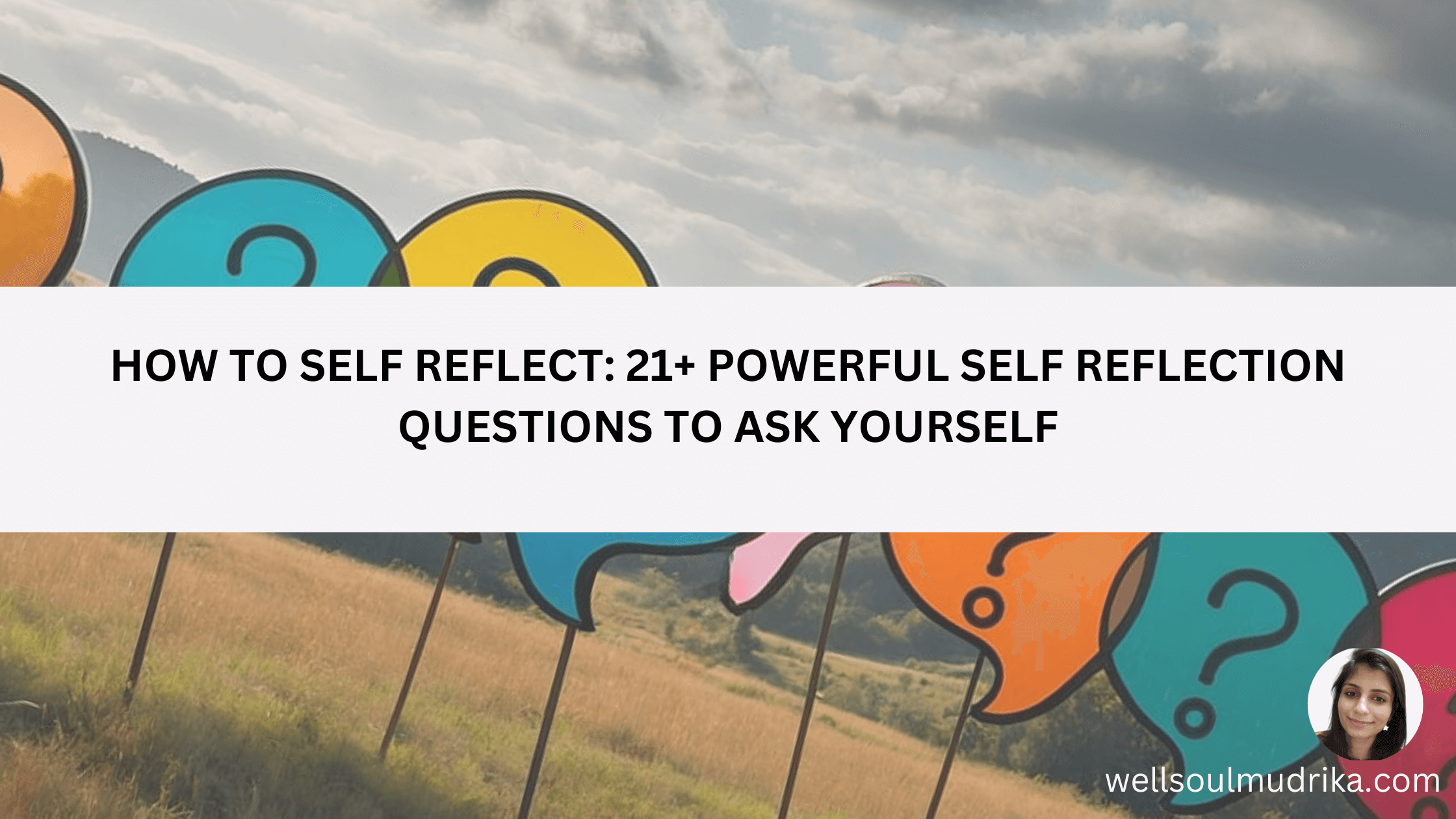Learn 9 daily mindset shifts to challenge negative self talk, quiet the inner critic, rewire how you speak to yourself, and break free from inner criticism.

There’s a voice in your head that no one else hears, and sometimes, it’s not very kind. Remember when you forget a deadline, overthink a text, or skip taking care of your health? And suddenly, that voice whispers: “Why can’t you just get it right?”
I have been there and I can feel you. That quiet critic in your mind doesn’t always scream; it slowly eats away your self-esteem.
But you weren’t born with it, which means that voice was learned. And, so it can be unlearned too. It’s time to challenge negative self talk. Right?
Self talk isn’t just background noise. It’s the script you live by. And when that script starts turning against you, it’s time to rewrite it.
This guide isn’t about toxic positivity or pretending everything’s okay. It’s about shifting your inner dialogue gently, daily, so you can meet yourself with the same kindness you give everyone else.
Let’s begin with 13 small but powerful shifts that can help you challenge negative self talk every single day.
What Is Negative Self Talk?
Negative self talk is the inner dialogue that criticizes, doubts, or puts you down. It’s the voice that says things like “I’m not good enough” or “I always mess things up.”
And, when it becomes constant, it can drain your energy, self-esteem, and motivation.
Here are some common forms of negative self Talk:
- Filtering: You only see the bad in a situation, ignoring the good.
- Catastrophizing: You expect the worst-case scenario. ( that’s me)
- Personalizing: You blame yourself for things outside your control.
- Black and white thinking: Everything is all good or all bad, no in-between.
Negative self talk often shows up in small, automatic thoughts which may seem harmless, but over time, they shape how you feel about yourself and your life.
Also Read: 25 Gentle Reminders for Hard Days When You’re Emotionally Tired
Why It’s Important to Challenge Negative Self Talk
If left unchecked, negative self talk can quietly affect every part of your life: your mood, your motivation, your relationships, and even your physical health.
As per a study, cognitive restructuring, the process of challenging and reframing negative thoughts, is a key component of CBT (Cognitive Behavior Therapy) and has been shown to reduce symptoms of anxiety and depression.
When you challenge your self talk, it’s not like you are pretending life is perfect. Rather, you’re giving yourself permission to see things more clearly and speak to yourself with the same kindness you offer others. Changing how you talk to yourself can change how you live your life in unimaginable ways. The next section covers how to challenge negative self talk in detail.
Related Read: How to Stop Being Negative? ( 7 Signs + 9 Gentle Ways)
9 Empowering Ways: How To Challenge Negative Self Talk Every Day
Ready to change the way you talk to yourself? Let’s walk through 9 empowering shifts to help you challenge negative self talk which you can practice daily to quiet the inner critic. After this, I hope you will be able to speak to yourself with more compassion and self-love.
1. Catch, Challenge, Change
You know how it goes: you make one small mistake, and suddenly your inner voice spirals with, “You always fail”. To challenge negative self talk in that moment, try this helpful sequence:
- Catch the thought: Notice it (“That’s my critic speaking.”)
- Challenge it: Ask: “Is this really true? What about other times?”
- Change it: Rephrase to something more balanced, like, “I messed this up, but I’ve succeeded many times too.”
It isn’t just some feel-good mantra; it’s the core of cognitive restructuring, a powerful technique from Cognitive Behavioral Therapy (CBT). And like any skill, the more you practice it, the more natural it becomes.
2. Go Evidence Hunting
Ever noticed how your brain jumps to conclusions… without hearing both sides? It throws out thoughts like “I’m not good enough” or “Everyone’s judging me”, no questions asked, just guilt.
One of the most powerful ways to challenge negative self talk is to play detective instead of a judge. Pause and ask:
- What actual proof do I have that this thought is true?
- Is there any evidence that shows the opposite?

Like when your mind whispers, “Nobody likes me,”… but yesterday, your friend messaged just to check in. That counts, too. This tiny shift pulls you out of the emotional drama and back into reality, gently and without judgment. Try this.
3. Reframe With Curiosity
You know, harsh thoughts usually come fast, like emotional reflexes. Before you know it, your mind’s already decided: “You’re not enough.”
But what if you didn’t try to silence those thoughts and simply got curious instead?
Ask gently:
- What’s beneath this thought?
- What triggered this thought?
- What would I say to a friend thinking this?
I am sure you must be thinking, curiosity doesn’t fix everything. You are right, but at least it creates space to breathe, to understand, and to respond instead of react. And sometimes, that space is all you need to change the story.
When you get curious, you stop making yourself the enemy and start becoming your own supporter.
4. Use the Friend Filter
The next way to challenge negative self talk is by using the Friend Filter. Imagine your best friend is having a rough day.
If your best friend comes to you after a rough day, feeling down on themselves. Would you ever say to them what you just said to yourself? Probably not, you’d offer comfort, encouragement, maybe even a hug.
So why not think the same for yourself? Next time your inner critic tries to mess up, pause and ask:
“Would I say this to someone I care about?
If the answer is no, swap “You’re so useless” for “You had a rough moment, but you’re still trying, and that’s what counts.”
It might feel strange at first, but with practice, your inner voice will start sounding less like a harsh critic and more like a caring friend who’s always in your corner.
5. Swap Harsh Words for Softer Ones
Your brain loves drama. It throws out words like “always,” “never,” or “everything’s ruined” when one small thing goes wrong.
Start paying attention to these extreme phrases.
Instead of “I always screw things up,” try “This time didn’t go as planned, but I’m learning.”
Swapping “never” for “not yet” and “failure” for “setback” may seem small, but it softens the emotional impact.
You’re not lying to yourself, you’re giving yourself a fairer version of the truth.
This language shift teaches your nervous system that you’re safe and not spiraling.
6. Ground Yourself with the 5-4-3-2-1 Tool
When your thoughts start racing, it’s like your body joins the panic party. You feel tense, dizzy, and disconnected.
But, the 5-4-3-2-1 technique brings you back, and this is your sure-shot way to challenge negative self talk and shift your focus.
Look around and name:
- 5 things you can see
- 4 things you can touch
- 3 things you hear
- 2 things you can smell
- 1 thing you can taste
This mindfulness tool works by shifting your focus from your thoughts to your senses, a proven grounding strategy used in trauma therapy and anxiety reduction.
Use it mid-spiral. It’s like pressing the reset button on your brain.
7. Try a Gratitude Flip
Challenge negative self talk by giving yourself permission to notice the good and be grateful, even on tough days. You don’t have to “positive-vibes-only” your way out of a bad day. But finding just one small thing that went right can totally flip the script.
It’s important to recognize what’s not falling apart. For example, instead of thinking, “I wasted the whole day,” try telling yourself, “I made time to rest, and maybe that’s exactly what I needed.”
Even tiny wins like “I drank enough water today” or “I showed up when I didn’t feel like it” can gently shift your brain from focusing on what’s missing to appreciating what’s enough.
I like to end my day by writing one simple line in my journal about something good that happened. It’s a small daily habit, but it helps me close the day with kindness and peace.
8. Label Your Inner Critic
Sometimes, the meanest person you talk to all day… is you. But here’s a simple way to quiet it: give it a name.
Seriously.
Call it The Critic or something funny like Drama Queen. Naming your inner critic turns it into a separate part of you. This helps create distance between you and the negative voice
This makes you realize, “Oh, that’s just The Critic again, not the truth.”
It might sound silly, but research in narrative therapy shows that externalizing your inner dialogue can reduce its emotional grip and build self-compassion. I mean, what else do you need when challenging your negative self talk?
So when that harsh voice shows up, remind yourself: you’re not the critic, you’re the one who hears it, and you get to choose how much power it holds.
9. Use a Thought Rescue Note
When negative thoughts take over, it’s easy to forget how to be gentle with yourself. That’s why having a Thought Rescue Note can be your savior on tough days. It’s a quick list of kind, grounding phrases you can turn to when your mind starts to spiral.

Keep this note somewhere you’ll see it often, on your phone, your mirror, your laptop, or tucked inside your journal. It’s just a way to practice self-compassion that’s ready whenever you need it.
Here are some examples you might include:
- This feels tough, but I’m doing my best.
- Progress doesn’t have to be perfect; it’s about moving forward.
- I’ve gotten through harder days than this.
You can also take it a step further by recording a voice note to your future self. Hearing your own voice offering kindness can be surprisingly comforting. Save it on your phone and play it whenever your inner critic gets too loud.
Well, these were the ways to challenge negative self talk and feel better about yourself.
How To Challenge Negative Self Talk: The Framework
Now that you’ve got a few self talk tools in your back pocket, here’s a simple framework to help you use them in real time. This will help you pause, reflect, and reframe, and give yourself better inner language to work with.
Let’s see some examples of challenging negative self talk:
Table: Thought → Trigger → Challenge → Reframe
| Negative Thought | Trigger | Challenge It With… | Reframe Instead With… |
| I always mess things up. | A minor mistake | Is that always true? What did I learn? | I’m learning and improving every time. |
| Nobody cares about what I say. | Feeling ignored | Is that a fact or a fear? | My voice matters, even if not everyone listens. |
| I’m not good enough. | Social media comparison | What have I done in the past that was hard, too? | I bring value in my own way. |
| I’ll never be able to do this. | Facing a new challenge | Did they say that, or am I assuming? | I can take it step by step like I always do. |
| They probably think I’m annoying. | Overanalyzing a convo | Did they say that or am I assuming? | According to whom? What makes me unique? |
| I can’t handle this. | Feeling overwhelmed | Haven’t I handled tough things before? | This is tough, but I’ve gotten through worse. |
| Things never work out for me. | Disappointment or failure | Are there times they did? Am I giving up too soon? | This is a setback, not the full story. |
Also Read: How to Self Reflect? 21+ Powerful Questions To Ask Yourself
Why Challenging Negative Self Talk Feels So Damn Hard (And What You Can Do About It)
If you’ve ever wondered why your inner critic is so loud, even when you “know better”, this part is for you. See, these aren’t excuses. They are real blocks. But they are also things you can work with. So here’s the why and what can be done.
1. It’s automatic: You’ve repeated the same self talk for years. Now it feels like the truth.
→ Write it down. Just seeing the thought can start to break its pattern.
2. Perfectionism runs deep: You feel like anything less than flawless doesn’t count.
→ Always aim for done because done is better than perfect. Progress is still powerful.
3. You’re stuck in comparison: Everyone else seems more successful, more loved, more enough.
→ Shift focus to your lane. Celebrate one thing you did well today.
4. You mistake harshness for honesty: You think being kind to yourself means lying or avoiding reality.
→ Tell the truth gently. You can be real without being ruthless.
5. You’re afraid of going soft: Self compassion feels like letting yourself off the hook.
→ The truth is people grow faster when they feel safe, not shamed.
6. You don’t even notice it: The negativity happens so fast, you barely realize it.
→ Practice awareness. Catching the thought is a win.
Wrap Up: How To Challenge Negative Self Talk For A Better Life
You know, you don’t have to believe every thought you think, especially the ones that tear you down.
Some days, it’ll feel easy. Other days, not so much. As you now know how to challenge negative self talk, you understand that challenging negative self talk is not about ignoring your feelings or pretending everything’s fine. It’s about learning to speak to yourself with more truth, softness, and support. The same way you would with someone you love.
So, try to follow these actionable shifts in your daily life, show yourself grace, and build a safer space inside your own mind. And when the next time that critical voice shows up, you’ll be ready, not with silence, but with a stronger, wiser one.
Share what resonated with you and your feelings in the comments!
FAQs
1. How can I stop negative self talk quickly?
Stopping negative self talk in the moment starts with awareness. When you catch a harsh thought, pause and name it, either in your mind or out loud. This creates distance between you and the thought.
Then, ask yourself:
Is this thought 100% true? Would I say this to a friend in the same situation?
Practicing this consistently helps reduce the grip of negative thinking over time.
2. Does everyone experience negative self talk?
Yes! Negative self talk is a common part of the human experience. We all have an inner critic that tends to exaggerate our flaws or failures.
The difference lies in how we respond to that voice. If you learn to notice, challenge, and reframe your thoughts, you will be able to better manage stress and maintain a healthier relationship with yourself.
So if you struggle with it, you’re not broken, just human. And with practice, your inner dialogue can become more supportive.
3. Can challenging negative self talk improve mental health?
By learning to shift your inner narrative and challenge negative self talk, you develop greater self awareness and emotional resilience.
Even small mindset shifts like replacing “I can’t do this” with “This is hard, but I can try” can change how you approach your day, relationships, and challenges. The more compassionate your self-talk becomes, the more balanced your mental health can feel.
4. Why is self talk so critical to mental health?
Your self talk acts like a filter through which you view yourself, your relationships, and the world.
When that filter is filled with criticism, judgment, or fear, it can blur your confidence, affect your decisions, and even drain your motivation. On the other hand, positive self talk builds emotional safety, it becomes the voice that picks you up, not the one that pulls you down. Healthy self talk is about acknowledging reality while offering yourself the same empathy you’d extend to someone you love.
5. What is the best way to challenge negative self talk?
The best way is to begin by noticing your most common negative thoughts. Write them down if you can. Then, gently challenge each one by asking:
- What triggered this thought?
- Is this thought true, or just a fear?
- What’s a more compassionate way to look at this?
Over time, create new negative thoughts reframing scripts for yourself that help you speak with more truth and care.



